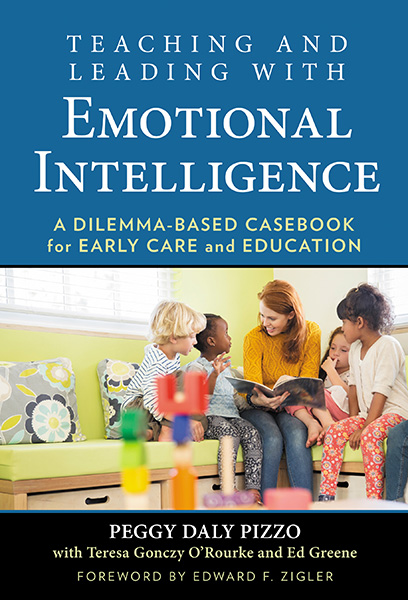Professors: Request an Exam Copy
Print copies available for US orders only. For orders outside the US, see our international distributors.
With: Teresa Gonczy O’Rourke, Ed M. Greene
Foreword by: Edward F. Zigler
Publication Date: November 17, 2017
Pages: 176

In this much-needed text, the author provides dilemma-based teaching cases that teachers and early childhood leaders can analyze and discuss to build problem-solving and decision-making skills. Readers will reflect on challenges they are likely to experience in practice, addressing issues such as linguistically and culturally isolated children, children refusing to share with others, high-energy children struggling to develop self-regulation and executive function, and children experiencing trauma. They will also examine issues related to inadequate resources and teacher compensation. Each case portrays early childhood practitioners as they transform challenging scenarios into opportunities for the growth of social and emotional skills. This one-of-a-kind resource can be used for professional development, for courses that address the emotional and social development of young children, and with students beginning their supervised field experience to help bridge their research and practice.
Book Features:
Peggy Daly Pizzo is the director of the Early Learning Project in the School of Education at Stanford University. She also provides technical assistance and consultation for community-based agencies such as Head Start.
“This excellent book will restore balance to our school readiness accountability initiatives. It demonstrates the growth of the whole child, using well-written, research-based portrayals of teachers and leaders displaying emotional intelligence and fostering its growth in children, teachers, and leaders. This book also restores balance to the way we educate teachers and leaders.”
—From the foreword by Edward F. Zigler, Sterling Professor of Psychology, Emeritus at Yale University and founder of The Edward Zigler Center in Child Development and Social Policy
“This is an important book, for it emphasizes that the first thing children need is to know they are loved, the second is to learn self-regulation, and the third is to know how to get along with others. Peggy Pizzo’s book shows parents and teachers how they can help children learn these things and thrive.”
—T. Berry Brazelton, Professor of Pediatrics Emeritus at Harvard Medical School and Founder of Brazelton Touchpoints Center
"As a long-time admirer of Peggy Pizzo and her seminal work, I am delighted that she is bringing an innovative approach—using teaching cases—to early childhood professional development in ways designed to help children learn and grow."
—Ellen Galinsky, president, Families and Work Institute
Foreword by Ed Zigler
Preface
Acknowledgments
Introduction
with Teresa Gonczy O’Rourke
A Professional Development Approach Based on Teaching Cases
What Are Teaching Cases?
Why a Casebook for Early Childhood Teacher Education?
How Should This Casebook Be Used?
Developmentally Appropriate Practice
The Focus on Emotional Intelligence in This Casebook
What Is Emotional Intelligence?
Frameworks for Emotional and Social Intelligence
The Cases in this Casebook
Part I: Cases on Teacher–Child Interaction
Part II: Cases on Early Childhood Leadership
Conclusion
PART I: CASES ON TEACHER–CHILD INTERACTION
Case 1. Tomas, Arthur, and Sharing: Resolving Conflicts
Questions for Discussion
Resources for Delving Deeper
The Development of Social and Emotional Competence in Young Children
The Importance of Cultural and Linguistic Sensitivity in Teaching
Case 2. Ming: A Mystery Story for Teachers and Student Teachers
Questions for Discussion
Resources for Delving Deeper
Best Practices in Early Care and Education Programs
Temperament and Its Influence on Children's Behavior and Development
The Reserved, "Inhibited" or "Highly Reactive" Temperament and Its Influence on Children's Behavior and Development
Practical Recommendations for Helping the Reserved Child in a Classroom
Preschool English Language Learners
Differences among Euro-American, Chinese-American, and Taiwanese Chinese Young Children Regarding What They Understand as "Happiness"
Home–Preschool Relationships with Diverse Families
Practical Suggestions and a List of Programs That Serve Diverse Families Well
Case 3. Sky-High Energy in Classroom Five
with Teresa Gonczy O'Rourke and Ed Greene
Questions for Discussion
Resources for Delving Deeper
Self-Regulation and Executive Function
Development of Boys of Color
Value of Positive Classroom Strategies to Foster Development
Mental Health Consultation
ADHD
Family Engagement
Designing Classroom Supports and Early Intervention Strategies in Promoting Social and Emotional Development
Expulsion of Preschool Children
Implicit Bias
Building Emotional Intelligence Skills That Help Children Regulate Their Behaviors
Case 4. Roberto and Maria: Two Children Dealing with Trauma
Questions for Discussion
Resources for Delving Deeper
Overview of Trauma
Impact of Trauma
Helping Traumatized Children
Preventing Burnout in Teachers
Resilience in Young Children
PART II: CASES ON EARLY CHILDHOOD LEADERSHIP
Case 5. Coming to Ground: The Leaders of All Our Children Head Start Agency Visit a Local Center with Problems
Questions for Discussion
Resources for Delving Deeper
Leadership
Framework for Best Practice in Early Care and Education Programs
The Continuum of Health and Safety as Well as Cognitive and Emotional and Social Characteristics of Early Childhood Programs
Assessment and Rating Scales
Social and Emotional Learning
Using Data to Improve Outcomes
Issues Related to Inadequate Compensation for Teachers
Case 6. Crises and Compassion: The Leaders of All Our Children Head Start Agency Use Emotional and Social Intelligence to Navigate Through Challenges
Questions for Discussion
Resources for Delving Deeper
Leadership
Compensation
Family Engagement
Value of Good Teacher Preparation and Ongoing Professional Development
Value of Social and Emotional Learning
Value of Early Math
Value of Early Literacy
Value of Adult Speech to Infants
Using Data to Improve Outcomes
Conclusion
Recommended Reading
References
Index
About the Author and the Contributors
Professors: Request an Exam Copy
Print copies available for US orders only. For orders outside the US, see our international distributors.